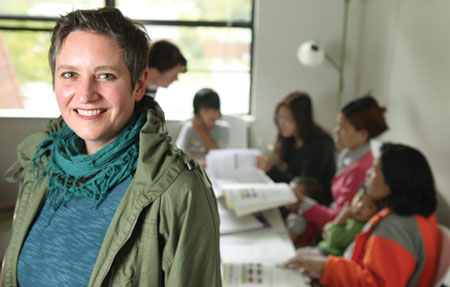
In 2011, Tennessee welcomed 1,236 refugees from 17 different countries, most of them settling in Nashville. As is true for the entire nation, the largest groups came from Bhutan, Burma and Iraq. All of them had in common, as the United Nations puts it, having fled their country and being unwilling or unable to return due to a well-founded fear.
For a refugee, the first order of business is survival, and the key to survival in the United States is learning English. For Angie Harris, MEd’10, director of English as a second language at the Tennessee Foreign Language Institute, making sure Nashville’s refugees learn English literally keeps her up at night.
One of those nights, an idea came to Harris after she attended a meeting of community leaders during which lack of transportation surfaced as the No. 1 barrier refugees face in attending English classes. If the refugees couldn’t get to class because of lack of private transportation and the complexities and cost of public transportation, why not take the classes to the refugees? Not by the traditional method of trying to find a willing host in the refugee community, which proves difficult for cultural and other reasons, but with the same level of professionalism students encounter when they’re able to get to a local community center. A classroom on wheels that could make the rounds of the apartment complexes where refugees live.
Thus was born the notion of ESL to Go. In a mobile classroom inside a custom-built truck, classes will be held around a table mimicking the traditional classroom setting where TFLI-trained instructors teach English at levels specific to the needs of the students. Students will be close to home with no transportation worries or other distractions from the all-important task of learning to function in a foreign land and a foreign language.
Learning to function in a foreign land and a foreign language is an experience Harris relates to well. A Peace Corps volunteer in Papua New Guinea from 1991 to 1993, Harris, who graduated from Tennessee Tech with teacher certification in Spanish, eventually spent eight years teaching English overseas, establishing language programs and schools in South Korea and Nepal.
“In Papua New Guinea, as a Peace Corps volunteer, I began to understand the tremendous value of a grassroots approach to development and education,” Harris says. “The single most important lesson I learned was that in order to teach effectively I had to learn from those I was teaching. That’s a lesson I’ve never forgotten, and it’s carried me to this point in my career.”
“The single most important lesson I learned was that in order to teach effectively I had to learn from those I was teaching.”
—Angela Harris, MEd’10, director of English as a second language at the Tennessee Foreign Language Institute
Harris settled in Nashville after teaching in Asia and began working at the Tennessee Foreign Language Institute, a unique state agency with the mission of teaching foreign languages to native Tennesseans and English to foreigners.
“Since joining TFLI in 1999, I’ve been able to put my accumulated experience and hands-on skills to good use by developing a program that teaches English to non-natives and a certification program for teachers of English as a second language,” Harris notes. “While I’m very proud of both achievements, I also began to be increasingly aware that I didn’t have the academic and theoretical grounding to match and support my grassroots experience.”
In looking at possible graduate programs, Peabody’s emphasis on community development became the deciding factor in her choice. “I clearly picked the right program,” she says. “After years of working on the front lines, the Peabody courses exposed me for the first time to the theoretical and organizational applications that frame and inform community development.”
In April 2012, the Tennessee Office for Refugees awarded TFLI’s ESL to Go program funding for operating expenses. The team now consists of three full-time employees and a selection of part-time teachers. Fundraising to purchase the mobile classroom was recently met, with generous grants from the Frist Foundation, the Memorial Foundation and a private donor, in addition to other donations. The truck will be delivered in March. In the meantime, TFLI is working in collaboration with area refugee resettlement centers to offer ESL classes at apartment complexes with existing classroom space. This is an acceptable solution for some, but won’t replace the mobile classroom because there are few apartment complexes with space to spare. The ESL to Go team plans to have the mobile classroom up and teaching by the spring of 2013.
For Harris, the ESL to Go project is the perfect storm that combines her academic training with her grassroots experience. She credits three of her professors at Peabody with playing a special role in giving her the skills and confidence that have led her to this point. “Dr. Vicki Davis, Dr. Linda Isaacs and Dr. Sharon Shields provided me with mentoring, personal attention and advice,” she says. “All three of these women are exemplary teachers and community leaders.”
Harris has become a leader in English as a second language education by synthesizing the academic research and resources Peabody provided with her experiential knowledge of community development.
“Those lessons [at Peabody] have guided me,” she says, “in creating broad community partnerships with private, city, state and nonprofit organizations that have culminated in the ESL to Go program.”